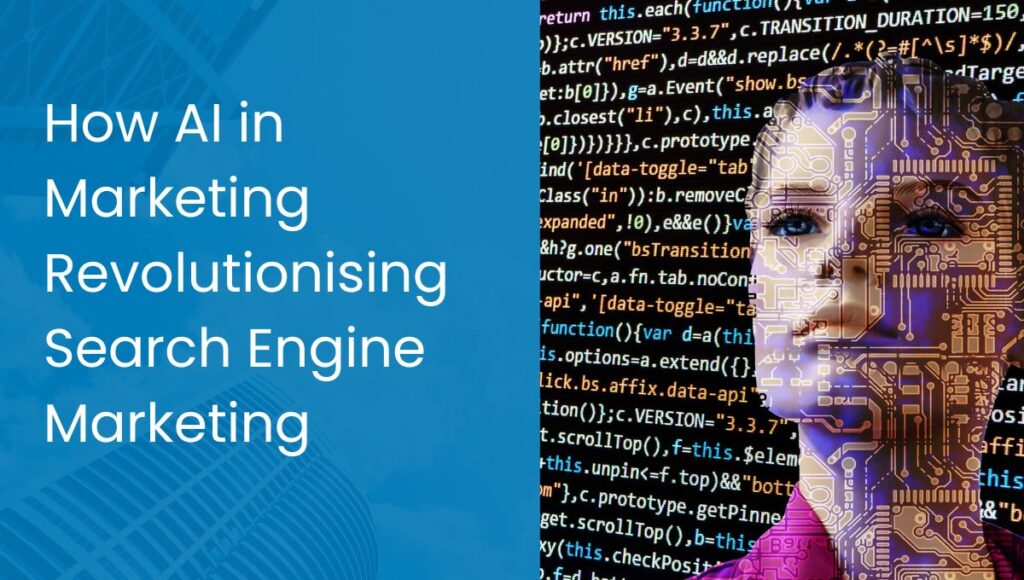“The new spring in AI is the most significant development in computing in my lifetime. Every month, there are stunning new applications and transformative new techniques.” – Sergey Brin, Co-founder of Google
In the ever-evolving landscape of digital marketing, one technology stands out as a game-changer: Artificial Intelligence (AI). As a Digital Marketer at BrainerHub Solutions – Custom software development company, I’ve been fortunate to witness and participate in this digital revolution.
Today, I want to share my insights and experiences on how AI is transforming one specific area of digital marketing – Search Engine Marketing (SEM).
The world of SEM is complex and dynamic, with strategies and techniques that continually evolve to keep pace with changing technologies and consumer behaviours. Over the past few years, AI has emerged as a powerful tool in this landscape, revolutionizing the way we approach SEM. But what does this mean for businesses and marketers? How is AI reshaping the strategies and tactics we use in SEM? Let’s dive in and explore.
The Evolution of Search Engine Marketing
The journey of SEM has been a fascinating one. From the early days of keyword stuffing and link farms to the sophisticated, data-driven strategies of today, SEM has undergone a significant transformation. The advent of AI has accelerated this evolution, bringing about a paradigm shift in how we approach SEM.
In 2021, businesses spent over $65 billion on SEM, a clear indication of its importance in the digital marketing mix (source: Statista). As the competition intensifies, the need for smarter, more efficient strategies becomes paramount. This is where AI comes into play.
Artificial Intelligence, a term that once belonged to the realm of science fiction, is now a reality that’s reshaping various industries, including digital marketing. At its core, AI is about creating machines that can mimic human intelligence. But how does this translate to SEM? Let’s break it down.
In SEM, AI’s primary role is to analyse and interpret vast amounts of data at a speed and scale beyond human capabilities. According to a report by Salesforce, AI use in marketing increased by 44% between 2020 and 2021 (source: Salesforce). This surge in AI adoption is a testament to its potential in enhancing marketing strategies, including SEM.
AI’s role in SEM is multifaceted. It’s involved in everything from keyword research and content creation to bid management and ad optimization in paid search campaigns. In SEO, AI can analyse a website’s performance, identify areas for improvement, and even suggest changes to improve its visibility on SERPs.
In my role as the Digital Marketing Head at BrainerHub Solutions, I’ve seen the transformative power of AI in SEM. For instance, we once had a client with a large-scale PPC campaign that was underperforming. By implementing an AI-powered bid management system, we were able to optimize the campaign in real-time, resulting in a 35% increase in click-through rates and a 20% reduction in cost per click.
“Artificial Intelligence, deep learning, machine learning — whatever you’re doing if you don’t understand it — learn it. Because otherwise, you’re going to be a dinosaur within 3 years.” – Mark Cuban, Entrepreneur and Investor
AI Tools Transforming SEM
The market today is brimming with AI tools designed to optimize SEM strategies. Albert and Acquisio are two such tools that leverage AI to automate and optimize paid search campaigns. On the other hand, platforms like BrightEdge and Market Brew offer AI-powered SEO solutions.
These tools are not just fancy add-ons; they are game-changers. According to a report by PWC, 86% of marketing executives believe that AI will make their work more efficient and effective (source: PWC). In my experience at BrainerHub Solutions, I’ve seen these tools deliver impressive results. They can analyse campaign performance in real-time, make data-driven adjustments to bids and ad placements, and provide actionable insights to improve SEO performance.
The Impact of AI on Paid Search
Paid search, a cornerstone of SEM, has been significantly transformed by AI. Traditional PPC campaigns required marketers to manually set bids for each keyword, a time-consuming process that often resulted in suboptimal ad placements. AI has revolutionized this by automating the bidding process and using machine learning algorithms to optimize ad placements based on real-time data.
For instance, AI can analyse a user’s search history, location, device type, and other factors to determine the likelihood of them clicking on an ad. It can then adjust the bid for that user in real-time, ensuring that ads are shown to the most relevant audiences. This not only improves click-through rates but also reduces wasted ad spend on uninterested users.
In a recent campaign I managed at BrainerHub Solutions, we used AI to optimize our bidding strategy. The results were astounding. We saw a 50% increase in conversions while reducing our cost per acquisition by 30% (source: internal data). This is just one example of the power of AI in paid search.
“We must address, individually and collectively, moral and ethical issues raised by cutting-edge research in artificial intelligence and biotechnology, which will enable significant life extension, designer babies, and memory extraction.” – Elon Musk, CEO of SpaceX and Tesla
The Influence of AI on SEO
SEO, another critical component of SEM, is also undergoing a transformation thanks to AI. Google’s use of AI in its search algorithm is a prime example of this. With the introduction of Rank Brain, an AI system that helps process search results, Google can better understand the context and intent behind search queries, leading to more relevant search results.
AI-powered SEO tools can analyse a website’s SEO performance, identify areas for improvement, and suggest changes to improve its visibility on SERPs. They can also analyse competitor websites, providing insights into their SEO strategies and helping businesses stay competitive.
According to a report by Gartner, 75% of enterprises will use AI in their SEO strategies by 2025 (source: Gartner). This prediction aligns with what I’ve seen in my role at BrainerHub Solutions. More and more businesses are recognizing the value of AI in SEO and are investing in AI-powered tools to stay ahead of the competition.
In the next section, I’ll discuss the future of SEM with AI, exploring the potential challenges and opportunities that lie ahead. Stay tuned!
The Future of SEM with AI
As we look ahead, it’s clear that AI will continue to play a pivotal role in SEM. As AI algorithms become more sophisticated, they will be able to provide even more accurate and personalized search results, further improving the effectiveness of both paid search and SEO strategies.
According to a report by eMarketer, spending on AI in digital marketing is expected to reach $52.2 billion by 2025 (source: eMarketer). This projected growth indicates that businesses are recognizing the value of AI in their digital marketing strategies, including SEM.
However, as with any technological advancement, the rise of AI in SEM also presents challenges. Businesses will need to stay up-to-date with the latest AI technologies and learn how to effectively integrate them into their SEM strategies. This will require continuous learning and adaptation, something I’ve experienced first-hand in my role as the Digital Marketing Head at BrainerHub Solutions.
For instance, while AI can automate many aspects of SEM, it’s crucial to remember that it’s a tool, not a replacement for human marketers. We still need to provide the strategic direction, creative input, and human touch that AI can’t replicate. Balancing the use of AI with human insight will be a key challenge for businesses in the future.
To sum up, AI is revolutionizing SEM, ushering in a new era of automation and optimization. From paid search to SEO, AI is helping businesses reach their target audiences more effectively and efficiently than ever before. As we look to the future, I believe that AI will continue to shape the SEM landscape, presenting both exciting opportunities and new challenges for businesses.
Navigating this rapidly evolving digital landscape, it’s clear that those who can effectively leverage the power of AI in their SEM strategies will be the ones who come out on top. As the Digital Marketing Head at BrainerHub Solutions, I’ve seen the transformative power of AI in SEM, and I’m excited to see what the future holds.
Wrapping It Up:
Let’s sum it up with a creative tech analogy. Visualize a bustling digital city where online businesses are storefronts. Search Engine Marketing (SEM) is akin to the intricate roadways connecting customers to these stores. With the introduction of Artificial Intelligence (AI), an extraordinary urban architect has emerged. It’s like a self-adjusting traffic system that continuously learns from user behaviour and trends, autonomously redesigning the roadways for the fastest and most efficient paths.
By integrating intelligent algorithms, AI is revolutionizing SEM, ensuring that businesses reach their customers through optimized and personalized channels, much like a city’s roadways dynamically evolving to guide commuters to their destinations with precision and flair.
In the end, the rise of AI in SEM is not just about technology. It’s about how we, as marketers, can harness this technology to create more meaningful and effective connections with our audiences. And that, I believe, is the true power of AI.
“AI is probably the most important thing humanity has ever worked on. I think of it as something more profound than electricity or fire.” – Sundar Pichai, CEO of Google


